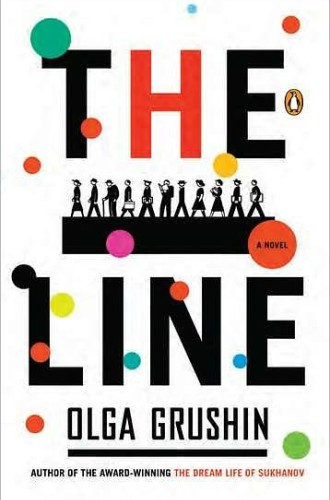Waiting for Selinsky
In the opening sequence of Olga Grushin's novel The Line, a respectable middle-school literature teacher approaches an old man in front of a kiosk with an innocent question: "What are they selling?" The old man's answer is haunting: "What would you like?"
"I'm sorry?"
"They are selling . . . whatever you would most like to have. What would you like?"
Anna, one of the story's three central characters, does not know the answer, and she has no intention of revealing her confusion to a stranger. But the book draws the reader into that question. What do you most want? Is it an object? A state of being? A form of consciousness? What would you be willing to sacrifice to get it? The Line is a powerful, even profound meditation on the nature of desire and its cousins—greed, longing and hope.
Read our latest issue or browse back issues.
The premise of the novel is drawn from a historical event. In 1962, the composer Igor Stravinsky returned to the Soviet Union from exile to give one concert. The line for tickets to this concert began forming a year in advance.
Intriguing as that historical event is, Grushin is not interested in re-creating it. Instead, she uses the historical instance to create something closer to an allegory or an elaborate fable.
The Line is the story of one family that waits in line for a year to attend the concert of the fictitious famous composer Igor Selinsky. Both time and space are compressed—the events from the novel contain elements from several periods of Soviet history, and the street on which the story takes place could be anywhere in the Soviet Union, though it is perhaps most like a street in Moscow.
Like any Soviet citizen with a little time to spare and some curiosity, Anna joins the line to find out what is being sold. Maybe, she thinks, it will be cakes or stockings or "a ruby-red drop of nail polish in a square glass bottle, or a smooth pebble of jasmine soap." That day the kiosk does not open and the line disperses.
But it forms again the next day and the next, becoming a locus of a strange source of hope for the people who join it. Anna finds that her imagination and her largely inchoate longings are shaped by the line, and she is embarrassed to reveal to her family—her tuba-playing husband and her teenage son—that she is spending so much time in a line when she doesn't even know why.
Gradually, the purpose of the line is revealed: the people are waiting for one-to-a-customer tickets to see a concert given by Selinsky. Once the purpose of the line is known, Anna's elderly mother, who spends her days hidden in her room, emerges to ask Anna to acquire a ticket so she can attend this concert. More and more people join the line, and a complex form of community emerges.
Anna's husband, Sergei, who was deprived of his dream of becoming a great violinist when the government decided he was too elitist, joins the line as well, with the intention of stealing the ticket for his own use. Their troubled teenage son, Alexander, also is cajoled into taking a turn standing in line. They occupy their place, number 137, day after day, night after night, through rumors, denunciations, despair and hope, waiting for the kiosk to open and tickets to be distributed.
Although waiting in line is drudgery, it also becomes a ritual infused with significance. While waiting, each character reflects on his or her dreams, needs, failures and disappointments. They imagine that acquiring a ticket will change their lives in some way that in reality is unlikely. They meet other people, make friendships, fall in love and become an unlikely and unshapely community. Over the course of the year, what they long for and what they imagine shifts and changes as they allow themselves to dream amidst the bleakness of Soviet Russia.
Under the rhythms of everyday life runs a current of dreamlike commentary in the form of Anna's mother's memories. Her words and thoughts provide the constant possibility of another way of seeing the world, even as she remains paralyzed by her memories. Her recitations of memory infuse each of the characters, stimulate their imaginations and provide a commentary on seeing and seeking. They suggest that the interplay between what is real and what is imagined is significant in the formation of a complete life.
Grushin offers her characters the dignity of their dreams. Readers might be rooting for Sergei to wake up and take responsibility for his own life, but Grushin seems to respect his need to indulge in dreams and fantasies in order to find a form of salvation. She is not impatient with his restless searching, and she does not dictate an outcome. Likewise, Alexander wanders, finds bad company, endangers his family and yet gradually finds in himself and in relationships meaning and purpose. The Line has darkly absurdist elements: Is the line just a government plot? Will tickets appear suddenly in the middle of the night? Is waiting a hopeless enterprise? But in the end it is a hopeful novel, suggesting that the effort we make to create meaning is of value.
Many things make The Line a great novel. The prose is lush, sometimes verging on dense, but the novel is worth taking the time required to appreciate the intricate images. It recalls the work of Russian writers like Nikolai Gogol and Mikhail Bulgakov, who play with the nature of reality while exploring the heights and depths of the human spirit. Grushin writes in English but invokes and evokes the tradition of Russian literature. The language is rich, layered and unexpected.
The theological implications of the novel are understated but pressing. The act of waiting is a multilayered religious event; Selinsky is a provocative kind of "great hope" whose coming may or may not fulfill its promise; the people in line fill a liturgical function as they "sing" of both hope and need. The dilapidated and ill-used church at the end of the alley where the kiosk is located stands like a question mark at the end of a philosophical question. These layers, none didactic, invite readers to infuse the scenario with their own meaning.
Read Frykholm's interview with Grushin.







